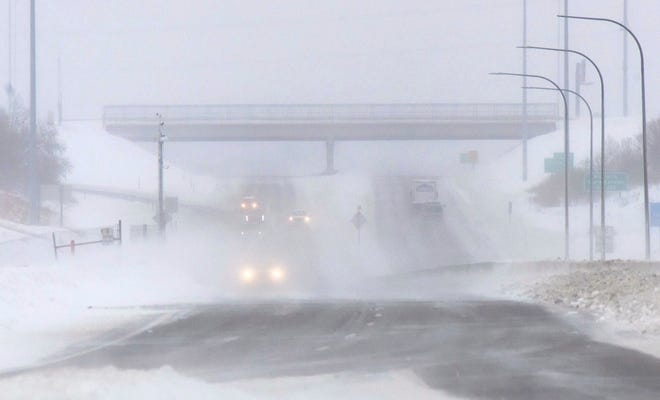
Fears over the omicron COVID-19 variant have spread across the globe within days of its discovery, sending stocks tumbling, prompting travel restrictions and drawing international attention to an uptick in cases in South Africa.
The reaction is happening weeks faster than the world’s sluggish response to the delta variant. By the time delta was named a "variant of concern" by the World Health Organization in May 2021, it had already spread in India for months and had been seeded across the globe.
In contrast, omicron was first reported to the WHO on Tuesday as COVID cases in South Africa have suddenly spiked to thousands per day. By Friday, it had been named and labeled a "variant of concern," the most serious type.
With omicron's high number of mutations, experts have raised concern about the risk of reinfection for people who have been vaccinated or previously infected with other variants.
Experts have applauded the WHO for moving quickly to sound the alarm on omicron, and South Africa for its fast, transparent reporting on the variant.
That will kickstart studies over the next few weeks into its contagiousness, virulence, and "immune escape," which is its ability to resist an immune response from prior infections or from vaccines, emergency physician and public health professor at George Washington University Dr. Leana Wen said.
"The level of alarm at this point is completely appropriate," Wen told USA TODAY. "I would much rather that we take action and then find out that, actually this this variant does respond very well to the vaccines that we have."
Early data is troubling, but incomplete, experts say.
The outbreak of the omicron variant in South Africa, where scientists first raised alarms about the variant's spread, was like a "vertical line," according to Dr. Eric Topol, vice president for research at Scripps Research in La Jolla, California.
"We haven't seen anything like that," he told USA TODAY. "The line of slope is much higher than the initial delta line."
Topol said the number of concerning mutations to the virus may make it more contagious than previous variants, and that it is likely to have evolved in an immunocompromised person.
Also in the news:
►The CDC this week dropped its percentage of vaccinated adults in Pennsylvania by nearly five percentage points, to 68.9% from 73.7%, in what apparently was a data correction to weed out duplicates.
►The World Trade Organization is postponing its conference of government ministers set to open Tuesday after Switzerland initiated new travel restrictions following the emergence of omicron.
►Stocks sank Friday, with the Dow Jones Industrial Average briefly falling more than 1,000 points, as investors reacted to news of omicron.
📈Today's numbers: The U.S. has recorded more than 48.1 million confirmed COVID-19 cases and more than 776,000 deaths, according to Johns Hopkins University data. Global totals: More than 260.5 million cases and more than 5.1 million deaths. More than 196.1 millionAmericans — roughly 59% of the population — are fully vaccinated, according to the CDC.
Keep refreshing this page for the latest news. Want more? Sign up for USA TODAY's Coronavirus Watch free newsletter to receive updates directly to your inbox and join our Facebook group.

Omicron cases found in UK, other countries; experts say it could be in US undetected
Even with the fast reaction to news of omicron, cases have been reported in travelers in Belgium, Israel, Hong Kong and the UK.
United Kingdom Health Secretary Sajid Javid confirmed Saturday that two people tested positive for the omicron variant in Nottingham and Chelmsford, a southeastern English town. He added the cases were related to travel from southern Africa.
Germany said it has a probable case, and authorities in the Netherlands are working to see if 61 people who tested positive for COVID-19 after arriving on flights from South Africa have the omicron variant. The Czech Republic also detected a suspected omicron case in a person who spent time in Namibia, the Guardian reported.
There are likely already undiscovered cases in the U.S., Dr. Eric Topol told USA TODAY, a concern echoed by presidential medical adviser Dr. Anthony Fauci in a Saturday NBC interview.
"We have not detected it yet, but when you have a virus that is showing this degree of transmissibility and you're having travel-related cases they've noted in other places already, when you have a virus like this, it almost invariably is going to go all over," Fauci said.
Fauci called Biden's decision to restrict travel from South Africa and other countries in the region "prudent" and told Americans not to panic but to take the variant seriously as health experts learn more about omicron. He also urged vaccinations, adding that booster shots give "a very, very important edge" in warding off the virus, including potentially dangerous variants.
Scientists wait for answers to key questions
Scientists say there is still much to learn about the omicron variant, including key questions that remain unanswered.
Ashish K. Jha, dean of Brown University's school of public health, noted three metrics for evaluating the potential effect of a variant in a Twitter thread: if the new variant is more transmissible than the current predominant variant, if the variant causes more severe disease and if it will render prior infections or vaccines less effective.
All these questions remain largely unanswered, though Jha said it is "super unlikely" that the variant will render vaccines useless.
Experts say it may take weeks to know if current vaccines are less effective against omicron. Epidemiologist Céline Gounder estimates it may take about two weeks to make this determination.
Gounder said in a Twitter thread that scientists don't yet know how omicron may compare to delta in terms of how infectious it is and its incubation period.
What's happening in South Africa as omicron spreads?
In two weeks, South Africa has gone from low transmission rates to rapid growth in new cases. The spike in cases happened after a cluster of infections among university students in Pretoria, one of the country's capital cities, grew to hundreds then thousands, spreading to Johannesburg, South Africa’s largest city.
Scientists say the new variant is likely responsible for as many as 90% of the new cases, according to South Africa’s health officials.
The variant has also quickly infected young South Africans, reflecting a shift in the demographic profile of COVID-19 patients.
"Young people, in their 20s to just over their late 30s, are coming in with moderate to severe disease, some needing intensive care," Rudo Mathivha, head of the intensive care unit at Soweto’s Baragwanath Hospital, told an online press briefing. Some are vaccinated, but few are fully vaccinated, Mathivha said.
Despite the country's case numbers remaining relatively low with 2,828 new confirmed cases Friday, Mathivha urged hospitals to have critical care beds ready in case of the "worst case scenario" that omicron has a similar effect as delta.
Mathivha also encouraged vaccinations. About 40% of South African adults are currently vaccinated, and vaccination rates are lower among younger adults.
Omicron's impact on vaccines unclear, but contingency plans already rolling out
Health experts have said it will likely be weeks before the world has good data about how omicron may reduce the effectiveness of current vaccines, but Moderna has already announced a three-point strategy to combat the new variant.
Moderna says its strategy for responding to omicron involves three options for boosting COVID-19 vaccination, should the variant prove problematic for current vaccines.
The three options, according to a Friday release from the company: A higher dose booster, shots currently being studied that are designed to "anticipate mutations such as those that have emerged in the Omicron variant" and an omicron-specific booster — which is already in the works.
Andy Slavitt, who previously served as President Joe Biden's White House senior adviser for COVID response, said in a tweet that both Moderna and Pfizer-BioNTech have estimated a vaccine to combat a new variant could be developed in about 3 months, with some regulatory and logistical hurtles to follow.
"If we start in early December, new vaccines could be available by summer in much of the world," Slavitt tweeted.
Multiple media organizations on Friday reported Pfizer-BioNTech is studying the new variant and expects data within weeks. If warranted, a targeted vaccine could be developed within 6 weeks and ship within 100 days, the reports say.
Johnson & Johnson is also testing its current vaccine against omicron, according to CNBC.
Professor Andrew Pollard, director of the Oxford Vaccine Group, told BBC radio he was cautiously optimistic existing COVID vaccines would be effective in preventing serious illness from the omicron variant, adding that mutations in omicron appear to be in similar regions as the mutations in other variants.
"That tells you that despite those mutations existing in other variants the vaccines have continued to prevent serious disease as we’ve moved through alpha, beta, gamma and delta," Pollard, whose team developed the AstraZeneca vaccines, said. "At least from a speculative point of view we have some optimism that the vaccine should still work against a new variant for serious disease but really we need to wait several weeks to have that confirmed."
– Joel Shannon, USA TODAY
With identification of omicron, are more travel restrictions ahead?
Just when things were looking up for airlines and the rest of the travel industry, another COVID-19 variant has emerged. Early reports of the omicron variant instantly sparked restrictions on travel.
The United States, which lifted a pandemic-long travel ban from dozens of international countries including South Africa on Nov. 8, on Monday will reinstitute the ban for foreign nationals from eight African countries.
“We're going to be cautious, make sure there is no travel to and from South Africa and six other countries in that region. Except for American citizens who are able to come back," President Joe Biden said Friday.
Read more about what travelers need to know about the new restrictions and the potential impact on travel in the months ahead if the omicron variant spreads rapidly across the globe.
– Dawn Gilbertson, USA TODAY
Contributing: The Associated Press








